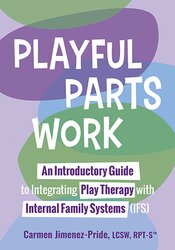
New Product Releases
Connect With Our Latest Blogs
Bringing Nature Into the Therapy Room: How Ecotherapy-Informed EMDR Deepens Trauma Healing
In a world grappling with climate change, mass displacement, and rising mental health needs, our approaches to trauma must evolve. Ecotherapy-Informed EMDR is one such evolution—a powerful fusion of evidence-based practice, cultural humility, and ecological wisdom.
Playful, Somatic, and Sensory-Based Strategies for Child Therapy
Dora Henderson explores how therapists can weave neuroscience—particularly polyvagal theory—into their work through somatic and sensory play to support emotional regulation, build safety, and foster resilience in ways that are both developmentally appropriate and deeply effective
Healing Parent-Child Estrangement: A Guide for Therapists
Learn how to navigate the emotional complexities of parent-child estrangement with these tips from expert Dafna Lender, LCSW.
Helping Clients Befriend Their Hyperaroused and Hypoaroused Parts
Dr. Alexia Rothman blends concepts from IFS therapy and PVT to support therapists in guiding clients toward self-trust, nervous system regulation, and inner harmony.
How to Recognize Autistic Burnout in Adult Clients
Learn how to recognize and respond to autistic burnout in adults using a neurodiversity-affirming, trauma-informed approach.
How Therapists Can Help Clients Upend Shame and Stigma
Gain practical insights for helping clients challenge internalized shame and societal stigma around women's experiences with these tips from Dr. Jessica Zucker, in conversation with Israa Nasir, LPC.
When Stress is Contagious: How the Nervous System Shapes Our Interactions
Dr. Kate Truitt shares how the nervous system influences interpersonal dynamics and introduces practical strategies to help clients recognize and manage these automatic responses, fostering more intentional and constructive interactions.
Pushing Pause on Your Amygdala: Strategies for Slowing Down the Stress Response
Dr. Kate Truitt discusses how the amygdala, or "Amy," reacts to perceived threats based on past experiences, often leading to stress responses. Plus, a free downloadable exercise designed to interrupt automatic reactions and engage the prefrontal cortex, allowing for more intentional responses to stress.
Bringing Nature Into the Therapy Room: How Ecotherapy-Informed EMDR Deepens Trauma Healing
In a world grappling with climate change, mass displacement, and rising mental health needs, our approaches to trauma must evolve. Ecotherapy-Informed EMDR is one such evolution—a powerful fusion of evidence-based practice, cultural humility, and ecological wisdom.
Playful, Somatic, and Sensory-Based Strategies for Child Therapy
Dora Henderson explores how therapists can weave neuroscience—particularly polyvagal theory—into their work through somatic and sensory play to support emotional regulation, build safety, and foster resilience in ways that are both developmentally appropriate and deeply effective
Healing Parent-Child Estrangement: A Guide for Therapists
Learn how to navigate the emotional complexities of parent-child estrangement with these tips from expert Dafna Lender, LCSW.
Helping Clients Befriend Their Hyperaroused and Hypoaroused Parts
Dr. Alexia Rothman blends concepts from IFS therapy and PVT to support therapists in guiding clients toward self-trust, nervous system regulation, and inner harmony.
How to Recognize Autistic Burnout in Adult Clients
Learn how to recognize and respond to autistic burnout in adults using a neurodiversity-affirming, trauma-informed approach.
How Therapists Can Help Clients Upend Shame and Stigma
Gain practical insights for helping clients challenge internalized shame and societal stigma around women's experiences with these tips from Dr. Jessica Zucker, in conversation with Israa Nasir, LPC.
When Stress is Contagious: How the Nervous System Shapes Our Interactions
Dr. Kate Truitt shares how the nervous system influences interpersonal dynamics and introduces practical strategies to help clients recognize and manage these automatic responses, fostering more intentional and constructive interactions.
Pushing Pause on Your Amygdala: Strategies for Slowing Down the Stress Response
Dr. Kate Truitt discusses how the amygdala, or "Amy," reacts to perceived threats based on past experiences, often leading to stress responses. Plus, a free downloadable exercise designed to interrupt automatic reactions and engage the prefrontal cortex, allowing for more intentional responses to stress.
Video: Balancing Humanity and Healing: Consultation Hour with Dr. Kate Truitt
Dr. Truitt reminds us that showing up as a whole human is the work. Your story, your struggles, your healing—they all matter. The more weallow ourselves to be fully present in our own lives, the more authentically wecan show up in the lives of others.






























